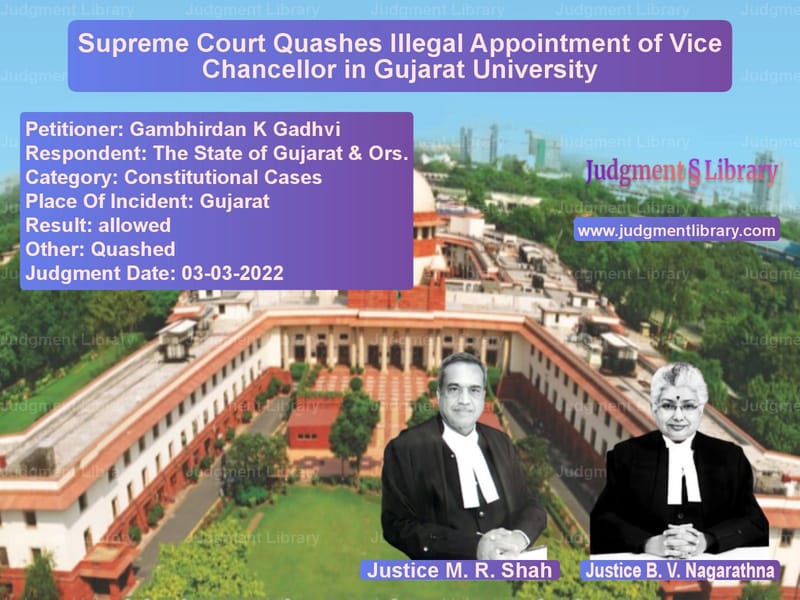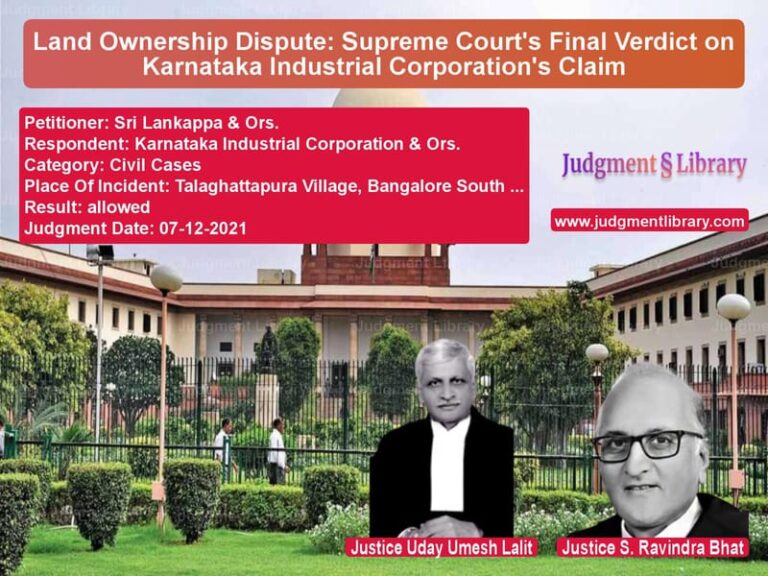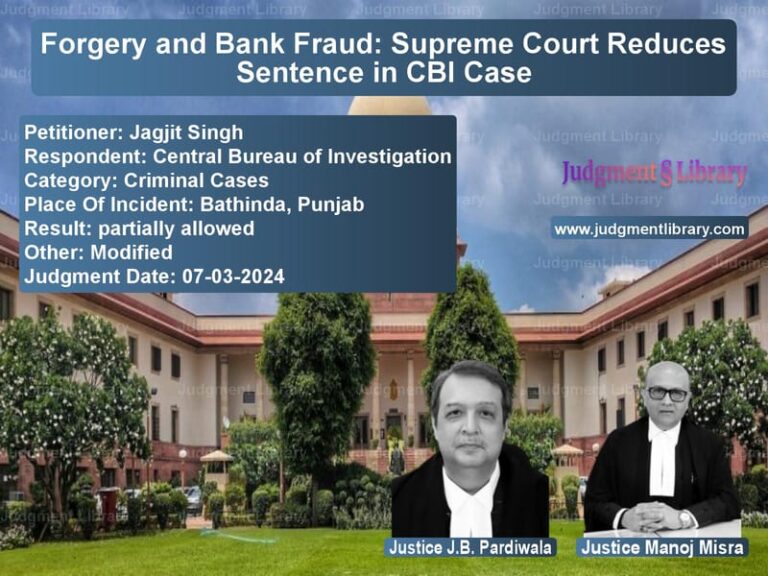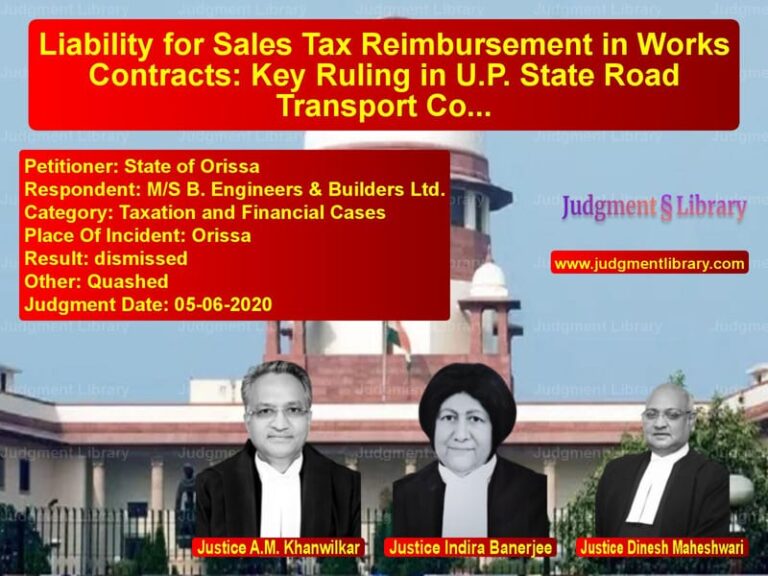Supreme Court Quashes Illegal Appointment of Vice Chancellor in Gujarat University
The Supreme Court of India has delivered a landmark judgment in the case of Gambhirdan K Gadhvi v. The State of Gujarat & Ors., where it quashed the appointment of the Vice Chancellor of Sardar Patel University (SP University), Gujarat, on the grounds that it violated the University Grants Commission (UGC) Regulations, 2018. The Court ruled that the appointment was contrary to the statutory provisions and failed to meet the prescribed eligibility criteria.
The petitioner, Gambhirdan K Gadhvi, filed a writ petition under Article 32 of the Constitution of India, seeking a writ of quo warranto against the appointment of the respondent as the Vice Chancellor of SP University. The petitioner argued that the appointment violated UGC Regulations, which were binding on state universities.
Background of the Case
The controversy arose when the State of Gujarat appointed the respondent as the Vice Chancellor of SP University in August 2019. The petitioner contended that:
- The appointment violated UGC Regulations, 2010 and 2018, which required a Vice Chancellor to have ten years of experience as a professor in a university system.
- The Search Committee that recommended the appointment was not constituted as per UGC guidelines, which mandated the inclusion of a nominee from the UGC Chairman.
- The appointment was made arbitrarily, without following due process, and was contrary to the principles of transparency and merit.
Petitioner’s Arguments
The petitioner, through his legal counsel, argued that:
- The appointment violated Regulation 7.3.0 of the UGC Regulations, which required a Vice Chancellor to have at least ten years of teaching experience as a professor.
- The appointment process was flawed as the Search Committee lacked a nominee from the UGC Chairman, which was a mandatory requirement under UGC guidelines.
- Despite previous warnings from the UGC and the Governor of Gujarat, the State government failed to comply with the regulations.
- The respondent’s appointment was influenced by favoritism and nepotism, undermining the quality of higher education.
Respondent’s Arguments
The State of Gujarat and SP University defended the appointment, arguing that:
- The UGC Regulations were not binding on state universities unless adopted by the State legislature.
- The appointment was made as per the Sardar Patel University Act, 1955, which did not mandate the inclusion of a UGC nominee in the Search Committee.
- The respondent was a qualified academician, and the appointment was based on merit.
Supreme Court’s Observations
The Supreme Court analyzed the relevant provisions and observed:
“The UGC Regulations, 2018, which prescribe the qualifications and appointment process for Vice Chancellors, are binding on all state universities receiving financial assistance from the Central Government. Any appointment made in violation of these regulations is ultra vires.”
The Court further noted that:
- The UGC Regulations had statutory force and were part of the law under Article 254 of the Constitution, which overrides state legislation in case of conflict.
- The State of Gujarat had accepted financial assistance under the UGC framework, making it obligatory to follow UGC norms.
- The respondent did not fulfill the minimum eligibility criteria of ten years of professorial experience.
- The appointment process was tainted with procedural irregularities, as the Search Committee was not constituted in compliance with UGC guidelines.
Supreme Court’s Verdict
Based on its findings, the Supreme Court:
- Allowed the writ petition and issued a writ of quo warranto, quashing the appointment of the respondent.
- Directed the State of Gujarat to appoint a new Vice Chancellor strictly in compliance with UGC Regulations.
- Criticized the State government for its continued defiance of UGC norms and emphasized the need for transparency and fairness in university appointments.
Legal Implications of the Judgment
The ruling has far-reaching consequences for the higher education system in India:
- Binding Nature of UGC Regulations: The judgment reaffirms that UGC Regulations are binding on all universities receiving central assistance.
- Standardization of Appointment Process: It ensures that Vice Chancellors across universities meet uniform academic and professional standards.
- Checks on Arbitrariness: The decision serves as a precedent against arbitrary appointments and reinforces the principle of merit-based selection.
- State Universities Must Comply: State governments can no longer disregard UGC norms while appointing key university officials.
Conclusion
The Supreme Court’s decision in Gambhirdan K Gadhvi v. The State of Gujarat & Ors. is a landmark ruling that upholds the rule of law in university governance. By striking down the illegal appointment, the Court has reinforced the importance of adhering to statutory guidelines and maintaining transparency in higher education administration.
This judgment will serve as a crucial precedent in ensuring that Vice Chancellors are appointed based on merit, competence, and integrity rather than political considerations.
Petitioner Name: Gambhirdan K Gadhvi.Respondent Name: The State of Gujarat & Ors..Judgment By: Justice M. R. Shah, Justice B. V. Nagarathna.Place Of Incident: Gujarat.Judgment Date: 03-03-2022.
Don’t miss out on the full details! Download the complete judgment in PDF format below and gain valuable insights instantly!
Download Judgment: gambhirdan-k-gadhvi-vs-the-state-of-gujarat-supreme-court-of-india-judgment-dated-03-03-2022.pdf
Directly Download Judgment: Directly download this Judgment
See all petitions in Fundamental Rights
See all petitions in Public Interest Litigation
See all petitions in Constitution Interpretation
See all petitions in Judgment by Mukeshkumar Rasikbhai Shah
See all petitions in Judgment by B.V. Nagarathna
See all petitions in allowed
See all petitions in Quashed
See all petitions in supreme court of India judgments March 2022
See all petitions in 2022 judgments
See all posts in Constitutional Cases Category
See all allowed petitions in Constitutional Cases Category
See all Dismissed petitions in Constitutional Cases Category
See all partially allowed petitions in Constitutional Cases Category







